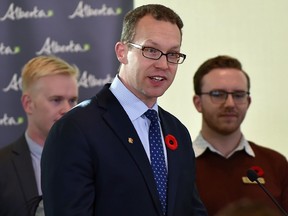NDP introduces bill to cap post-secondary tuition by 2020-21

Article content
The NDP introduced a bill Monday to cap post-secondary tuition and prevent international students from being saddled with unexpected tuition hikes.
It was the culmination of a review launched in 2016 that included a survey and focus groups, though the province hasn’t released the findings.
Bill 19, which amends the Post-Secondary Learning Act, was the first piece of legislation introduced during the fall sitting of the legislature.
If passed, post-secondary institutions will face a cap on the average tuition across all programs. The cap will be tied to the consumer price index. Individual programs will be able to increase tuition up to 10 per cent annually.
The NDP implemented a tuition freeze in 2015. The province plans to roll out the tuition cap in fall 2020, extending the current freeze for the 2019-20 academic year.
International students won’t see a tuition cap, however post-secondary institutions will have to give them a tuition guarantee at the time of admission. The move would stop tuition for international students from rising unexpectedly during their programs.
“International students would receive the full cost of their degrees up front, so there are no surprises while they’re trying to study,” said Advanced Education Minister Marlin Schmidt at a news conference after tabling the legislation.
“Really, students wrote this bill,” he said. “We needed to take the time to get it right.”
The bill also gives the minister authority over mandatory non-instructional fees such as fitness centre costs. Under the rules, students will also need to approve any new fees in that category.
Student advocacy groups have repeatedly called for a cap on tuition.
“(The Council of Alberta University Students) continually advocated for a long-term, predictable, sustainable tuition model, one that allows students and their families to better plan for the future,” said chairman Andrew Bieman, a student at MacEwan University. “I think we’ve made some progress in this regard.”
“While tuition is not the only expense that students face, it is the one that impacts them the most and the easiest for government to control,” said Brandon Vollweiter, spokesman for the Alberta Students’ Executive Council and a student at Concordia University of Edmonton.
“This policy protects all students … (they) are protected from future governments as they will not be able to change it behind closed doors.”
In the 2018-19 academic year, the average tuition for Alberta university undergraduates totalled $5,744, compared to $6,838 nationally.
As part of its tuition review, the province hired an external consultant to examine Alberta’s current post-secondary funding model and tasked a 20-person advisory group with proposing ways to create a more predictable system for fee increases.
Schmidt said there would be more information on post-secondary funding in next year’s provincial budget.
MacEwan University president Deborah Saucier said the bill also formally brings the school under the university model, meaning MacEwan will expand its board of governors, create a general faculties council and appoint a chancellor.
“For MacEwan it is a key milestone in our growth and development,” she said. “These changes are definitely in our best interest.”
Bill 19 gives the advanced education minister authority over future tuition or fee freezes and apprenticeship fees. It also requires public post-secondary boards to include at least two student representatives and confirms Alberta College of Art and Design’s transition to a university.
If passed, the bill would take effect next February.






Postmedia is committed to maintaining a lively but civil forum for discussion. Please keep comments relevant and respectful. Comments may take up to an hour to appear on the site. You will receive an email if there is a reply to your comment, an update to a thread you follow or if a user you follow comments. Visit our Community Guidelines for more information.